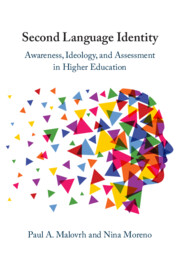Book contents
- Second Language Identity
- Second Language Identity
- Copyright page
- Dedication
- Contents
- Figures
- Tables
- Preface
- Acknowledgments
- 1 On Actors, Architecture, and L2 Advancedness in Higher Education
- Part I Advancedness and the L2 Learner
- Part II Variable Notions of Advancedness
- Part III Assessment, Identity, and Critical Language Awareness As Markers of Advancedness
- 8 Assessing Advancedness in the Age of Identity Construction and Global Citizenship
- 9 A Quantitative Analysis of L2 Identity and Critical Language Awareness
- 10 Imagining Global Citizenship and Intercultural Competence
- 11 Sociocognitive Awareness of L2 Advancedness in Higher Education
- Book part
- Bibliography
- Name Index
- Subject Index
8 - Assessing Advancedness in the Age of Identity Construction and Global Citizenship
from Part III - Assessment, Identity, and Critical Language Awareness As Markers of Advancedness
Published online by Cambridge University Press: 27 July 2023
- Second Language Identity
- Second Language Identity
- Copyright page
- Dedication
- Contents
- Figures
- Tables
- Preface
- Acknowledgments
- 1 On Actors, Architecture, and L2 Advancedness in Higher Education
- Part I Advancedness and the L2 Learner
- Part II Variable Notions of Advancedness
- Part III Assessment, Identity, and Critical Language Awareness As Markers of Advancedness
- 8 Assessing Advancedness in the Age of Identity Construction and Global Citizenship
- 9 A Quantitative Analysis of L2 Identity and Critical Language Awareness
- 10 Imagining Global Citizenship and Intercultural Competence
- 11 Sociocognitive Awareness of L2 Advancedness in Higher Education
- Book part
- Bibliography
- Name Index
- Subject Index
Summary
Previous chapters showed that learners are ready to engage in instruction that addresses sophistication. It therefore behooves the field to examine what the construct of “pronunciation” means to both learners and practitioners.
The present chapter explores the need for new assessment criteria; it makes a call for research incorporating variables that would examine, for example, L2 learners’ awareness of what we call “sophisticated-language use” so as to match their manifested beliefs with how they are able to describe what advancedness should look like.
Are we, as scholars, helping to perpetuate elite-bilingualism and nativespeakerism? And how do we affect identity construction among L2 learners and heritage speakers? We assert that the communicative approach in teaching and assessment needs to shift to a more holistic and sociocognitive approach. This also extends to the need to reconceptualize our focus of assessment so that all skills, as well as other forms of literacy and cultural awareness are included.
What remains to be examined in the next chapters is learners’ self-perception, identity construction and awareness of their own social agency as L2 speakers
- Type
- Chapter
- Information
- Second Language IdentityAwareness, Ideology, and Assessment in Higher Education, pp. 171 - 185Publisher: Cambridge University PressPrint publication year: 2023



